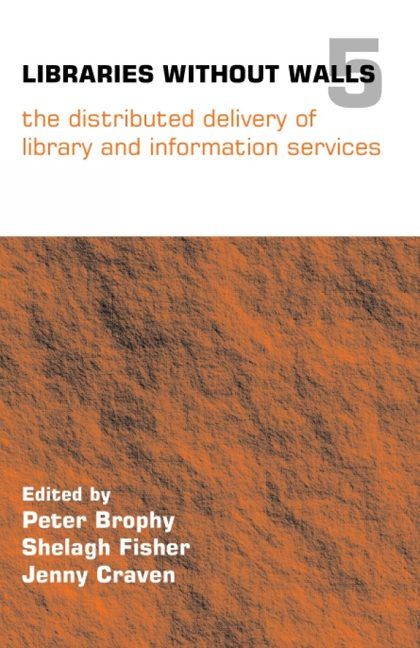Book contents
- Frontmatter
- Contents
- Contributors
- 1 Introduction
- 2 Keynote paper: beyond the mainstream of library services
- THEME 1 THE INTEGRATION OF LIBRARY SERVICES AND VIRTUAL LEARNING ENVIRONMENTS
- THEME 2 THE RELATIONSHIP BETWEEN USER NEEDS, INFORMATION SKILLS AND INFORMATION LITERACIES
- THEME 3 USABILITY AND ACCESSIBILITY OF DIGITAL LIBRARY SERVICES
- THEME 4 DESIGNING THE INFORMATION ENVIRONMENT: NATIONAL AND INSTITUTIONAL PERSPECTIVES
- 17 Supporting learning, teaching and research at Manchester Metropolitan University
- 18 Disintermediation via web services in Portuguese public libraries
- 19 Denmark's electronic research library: from national project to permanent activity
- 20 Research resources and the academic researcher
- THEME 5 THE CREATION OF DIGITAL RESOURCES BY USER COMMUNITIES
- Index
- Miscellaneous Endmatter
- Miscellaneous Endmatter
- misc-endmatter
- Miscellaneous Endmatter
18 - Disintermediation via web services in Portuguese public libraries
from THEME 4 - DESIGNING THE INFORMATION ENVIRONMENT: NATIONAL AND INSTITUTIONAL PERSPECTIVES
Published online by Cambridge University Press: 08 June 2018
- Frontmatter
- Contents
- Contributors
- 1 Introduction
- 2 Keynote paper: beyond the mainstream of library services
- THEME 1 THE INTEGRATION OF LIBRARY SERVICES AND VIRTUAL LEARNING ENVIRONMENTS
- THEME 2 THE RELATIONSHIP BETWEEN USER NEEDS, INFORMATION SKILLS AND INFORMATION LITERACIES
- THEME 3 USABILITY AND ACCESSIBILITY OF DIGITAL LIBRARY SERVICES
- THEME 4 DESIGNING THE INFORMATION ENVIRONMENT: NATIONAL AND INSTITUTIONAL PERSPECTIVES
- 17 Supporting learning, teaching and research at Manchester Metropolitan University
- 18 Disintermediation via web services in Portuguese public libraries
- 19 Denmark's electronic research library: from national project to permanent activity
- 20 Research resources and the academic researcher
- THEME 5 THE CREATION OF DIGITAL RESOURCES BY USER COMMUNITIES
- Index
- Miscellaneous Endmatter
- Miscellaneous Endmatter
- misc-endmatter
- Miscellaneous Endmatter
Summary
Introduction
Libraries are changing through the implementation and use of information technology. The world wide web has transformed the processes of disseminating information and is being increasingly used as a delivery vehicle for information services (Brophy, Fisher and Clarke, 2002). Library online services have been implemented throughout the world to meet the needs of a growing community of users. As a consequence, library users are reaping the benefits of being able to use library services independently at libraries, at home or at work.
In this context, an evaluation study was undertaken in the Department of Information Studies of the University of Sheffield aimed at investigating the use of internet services by Portuguese public libraries that are members of the Portuguese National Network of Public Libraries (NNPL; www.iplb.pt). This evaluation study was based on the emerging concept of disintermediation of information, which has triggered the change in the nature of work in public libraries using the internet (Hooper, 2001). This paper presents the results and findings of this study, by presenting and identifying the current state of the web presence and services of Portuguese public libraries and reporting on the impact of disintermediation. Furthermore, the paper also presents a critical review of how these libraries are meeting the challenges presented by the information society and aims to contribute to development of this field in Portugal while taking part in the expanding research into disintermediation.
Background and context
The information society and its main challenges
Portugal is a southern European country which, for historical reasons, has long been characterized by significantly low levels of literacy and access to information technology when compared with other European Union (EU) countries. This situation was clearly addressed in the Portuguese Green Book for the Information Society:
in the majority of homes, and even in many schools, books are scarce and the computer is not yet an easily accessible tool. Public libraries must be and should be the open door to the new world of digital and multimedia information, the access point to cyberspace for those who, due to socio-economic and cultural reasons, have not, in principle, ways of doing it at home (Ministério da Ciência e Tecnologia, 1997, 28).
- Type
- Chapter
- Information
- Libraries Without Walls 5The Distributed Delivery of Library and Information Services, pp. 184 - 194Publisher: FacetPrint publication year: 2004

